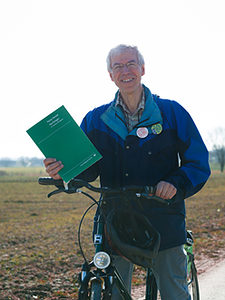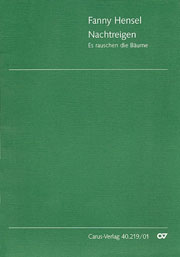In the Shadows
With his favorit work “Nachtreigen”, Eberhard von Oppen would like to pay tribute to Fanny Hensel.
Fanny Hensel, sister of Felix Mendelssohn Bartholdy, stod in the shadow of her brother for a long time. However, this is not based on her compositional and pianistic talents. As a woman, in the eyes of father and brother, she should not compose but take care of the household. While the composer did not publish many works herself, most of her music has now been published. The Nachtreigen [Night Dance] presented by Eberhard von Oppen is the setting of a poem by Fanny’s future husband and shows her considerable ability to create artistic and effective choral music.
“My dearest Fennel!” is the title of the most recent of the empathetic, literary biographies of musicians by the writer, music lover and connoisseur of music Peter Härtling. The title doesn’t refer to a vegetable, but to Fanny Hensel (1805–1847), who was always affectionately addressed using this pet name by her younger brother by four years Felix Mendelssohn Bartholdy in his letters.
The brother and sister, grandchildren of Moses Mendelssohn, both showed exceptional, and probably quite equal artistic gifts from an early age. They had the same teachers and stimuli, and remained in close contact throughout their lives, but whilst Felix was able to pursue his path as a successful professional musician, Fanny had to accept the fact that for her, in the words of her father, music could only be “an embellishment, never the foundation” to the “true, the only profession of a woman” – as a housewife. Behind this lay above all the Jewish-Christian family’s endeavours towards assimilation, to fulfil the bourgeois social norms of the 19th century in Prussia as completely as possible.
And so, Fanny was only able to use her abilities as a phenomenal pianist, conductor and composer within the confines of the famous private “Sonntagsmusiken” (“Sunday musicales”) in the Mendelssohn family home; as a choral singer she sang in Zelter’s “Singverein”, took part in premieres of her brother’s works as well as in the revival of Bach’s St Matthew Passion in 1829. Her father and brother Felix were extremely resistant to the publication of her over 400 (!) compositions – piano pieces, chamber music, lieder, duets, choruses, cantatas, even a large-scale oratorio, which anticipated Paulus in a number of ways – despite all kinds of artistic recognition. Only shortly before her early death in 1847 were a few works published. The fact that six of her solo songs appeared as part of Felix’s songs opp. 8 and 9, but under his name, was probably some sort of recognition for Fanny in these complicated circumstances. (Incidentally, her brother had no reservations about performing the Piano Concerto op. 7 by the young Clara Wieck in public in 1835.) The artistically thoroughly self-confident Fanny Hensel once complained ironically in a letter about her “miserable female nature, which is pointed out by the gentlemen around one in every step of one’s life.”
Only in our time has a large part of Fanny Hensel’s music been published; there is now even a Catalogue of works. The Carus program contains the complete sacred works and numerous secular choruses by Felix, but by comparison there is just a CD with the oratorio mentioned above and a single music edition by Fanny. In my opinion, this work is unjustly overshadowed; therefore, I would like to consciously shine a well-deserved spotlight on it, as one of so many works by ‘outsiders’.
In summer 1829 Fanny’s future husband Wilhelm Hensel, an important painter, draughtsman and talented amateur poet, who incidentally unreservedly promoted her talents, wrote a poem typical of its time about the night, the ideal scene of Romanticism. She set this for him as a birthday surprise after she had described it as ostensibly impossible to set to music. This setting shows her considerable ability at writing artistic and effective choral music: Nachtreigen is an astonishing unaccompanied composition of over 200 measures in length, skilfully divided both metrically and harmonically; it begins by contrasting two groups of four women’s and men’s voices alternately, gradually interweaving them and finally intensifying to a skilful fugato of splendid sonorous eight-part writing. At the beginning of the work Fanny – probably consciously – quoted the Allegro theme from Felix’s string quartet op. 12 of the same date, something which once again highlights the artistic symbiosis between the siblings. The original division of choral forces highlights Hensel’s text with a gesture, showing that the noisy men finally demonstrate some understanding of the wise reminder from the ladies not to disturb the peace of the night. To sum up: this is an enriching work even for a good amateur choir, which can give some late recognition to a composer tragically disadvantaged both by convention and by an early death.
Eberhard von Oppen joined Carus in 1987 after training (as a music retailer) and university studies (including musicology). He spends most of his working day on the phone to customers (and therefore recognises more voices than faces). He relies on choral singing for his sense of well-being and as a practical counterpart to his work in the publishing house.





Leave a Reply
Want to join the discussion?Feel free to contribute!